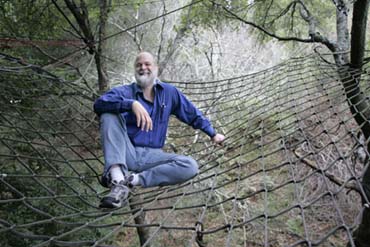Not as we know it
I had lunch yesterday with Steven Benner.
The last time we talked had been in August of 2007, and the discussion centered around his work in synthetic biology -- creating DNA strands with 12 nucleotides instead of 4, and proteins with more than 20 amino acids.
This time, he was here for the Astrobiology Science Conference to talk about life on other planets. But he took the time to visit Google to talk about his recent project, generating tools and techniques to cheaply and quickly find the genetic differences between a patient and a "reference genome", such as the one generated by the Human Genome Project.
By pulling out only the differences between two people, this approach can dramatically shorten the time needed to sequence a person's DNA, and reduce the cost accordingly. He estimates he can show how your DNA differs from Craig Venter's DNA for about $35,000. Since we know Venter's DNA from the Human Genome Project, knowing the differences gives us a complete picture of your DNA.
The talk intertwined with several of his other research interests, touching on his work using synthetic DNA to make diagnostic tests for HIV and hepatitis, his explorations into structural biology and experimental paleogenetics, and bioinformatics.
At lunch after the talk, the discussion ranged even more widely, as we toyed with solutions to problems of drug regulation, drug resistance in microbes, paleolithic diets, global warming, and species extinctions.
This is definitely someone I will want to talk to again -- there seemed to be new ideas in every sentence.
The last time we talked had been in August of 2007, and the discussion centered around his work in synthetic biology -- creating DNA strands with 12 nucleotides instead of 4, and proteins with more than 20 amino acids.
This time, he was here for the Astrobiology Science Conference to talk about life on other planets. But he took the time to visit Google to talk about his recent project, generating tools and techniques to cheaply and quickly find the genetic differences between a patient and a "reference genome", such as the one generated by the Human Genome Project.
By pulling out only the differences between two people, this approach can dramatically shorten the time needed to sequence a person's DNA, and reduce the cost accordingly. He estimates he can show how your DNA differs from Craig Venter's DNA for about $35,000. Since we know Venter's DNA from the Human Genome Project, knowing the differences gives us a complete picture of your DNA.
The talk intertwined with several of his other research interests, touching on his work using synthetic DNA to make diagnostic tests for HIV and hepatitis, his explorations into structural biology and experimental paleogenetics, and bioinformatics.
At lunch after the talk, the discussion ranged even more widely, as we toyed with solutions to problems of drug regulation, drug resistance in microbes, paleolithic diets, global warming, and species extinctions.
This is definitely someone I will want to talk to again -- there seemed to be new ideas in every sentence.
